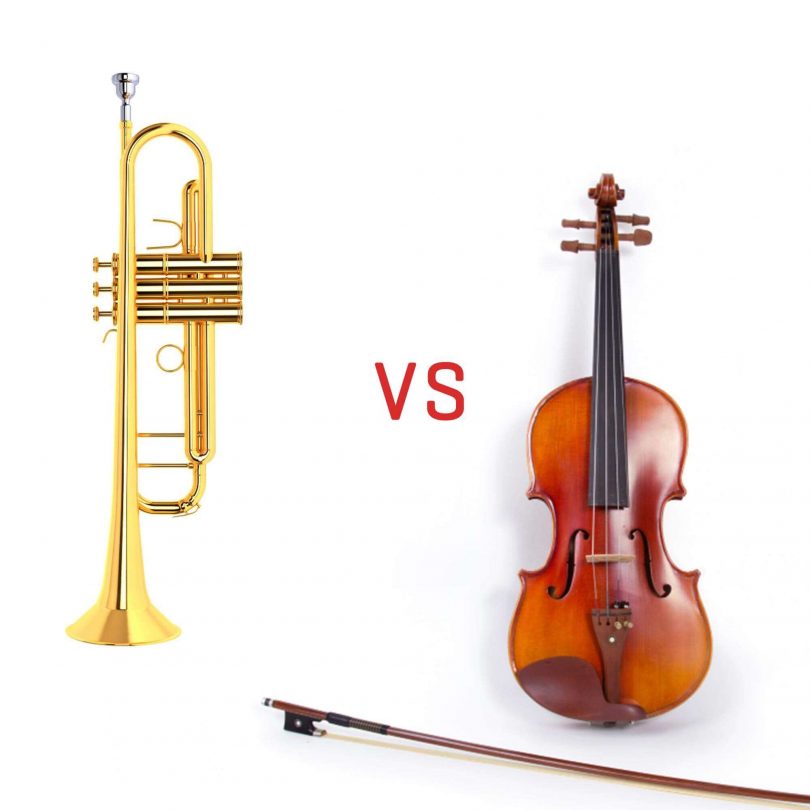What kind of musical instrument are you interested in learning? The trumpet and violin both appear to be intriguing and enjoyable to play. They have the potential to be quite rewarding, but there are a variety of factors to consider, ranging from how easy they are to learn.
Trumpet vs violin: which is easier
The trumpet and the violin both have characteristics that make them easy and difficult to play.
Advantages of the Trumpet:
The trumpet has three valves, so you only need to master eight-finger combinations, and you only ever play one note at a time on the trumpet, but the violin can play up to four notes at once.
The trumpet also has the advantage of being a bit smaller. Those who are just starting out with their instruments, or who frequently travel with them, may benefit from this feature.
The trumpet also makes it easy to play louder or quieter. In order to control the volume, you can alter your airspeed and breathing.
The Violin’s advantages:
Because violins come in a variety of sizes, learning to play the violin may be more accessible for young students. The smaller violins are easier for children to handle and play different notes on. Only the pocket trumpet comes in several sizes.
Furthermore, no exact amount of air or air pressure is needed by the musician to play the violin. The string can be played by either plucking or bowing. Some notes don’t even require any fingers on the left hand at all.
The violin also has the advantage of each note having a different position. As a beginner on the trumpet, it can be difficult to hit all the different notes because they all employ the same fingerings.
Which of the Two Instruments Is More popular?
The violin has a little advantage over the trumpet in terms of popularity, despite both instruments being equally well-liked. Because it comes in a variety of sizes, it’s easier for players of various ages to get involved.
In an orchestra, the violin is also far more popular than the trumpet. Two to four trumpet parts, each with a single player, are used in orchestral pieces. Some orchestras can have up to 30 violinists between the first and second parts.
The trumpet, on the other hand, is more commonly heard in other bands.
It’s a standard part of:
- A wind ensemble and a concert band
- A band that performs at parades
- A combination of jazz and big band
- These groupings have two to four trumpets, much like in an orchestra.
The violin has a wide range of solo works, as well as numerous concertos. In a conventional string quartet, the violin makes up half of the instrument.
Many solo pieces are available for trumpets as well. They’re also common in brass quintets, where two trumpeters are featured.
Brass (trumpets) and strings (violins) are the most popular instruments in their respective families (violin). Both instruments are well-liked and can be used in a variety of musical contexts, although the violin is perhaps the more widely used.
What is the average time it takes to learn each instrument?
Two to four years is a good amount of time to learn how to play the trumpet at a reasonable level. On the violin, achieving a similar level of proficiency can take up to a year longer, or three to five years. However, you can begin playing some tunes on the trumpet or violin in a short period of time.
-
Learning to play the Trumpet
An embouchure and buzzing of the lips are two essential skills for trumpet beginners. Even though mastering the fingerings is quick, you’ll need to spend some time honing your ability to recognize partials.
Air support is likewise a skill that requires time to learn and perfect. It will be much easier to play lengthier phrases once you have mastered that technique.
To play the trumpet for long periods of time may also be difficult. After a while, your chops may wear out, and you’ll have to take a practice break, which may cause some progress to be delayed.
-
Learning to play the Violin
The violin, unlike the guitar, does not have any frets that you can use to guide your fingers. As a result, playing out of tune is a whole lot easier.
You’ll also need to get familiar with how to use a bow and how to hold it. It’s possible that your fingers will hurt at first because of the strings.
Violinists don’t have to worry about damaging their lips while playing. Beginners, on the other hand, should concentrate on their posture to avoid injuries and other issues.
What About the Cost Differences?
The price of a beginner trumpet or violin can be as low as $100, but high-quality models can cost up to $400. About $1,000 to $2,000 is the price range for intermediate trumpets. A new professional horn might cost anywhere from $1,600 to $3,600.
Intermediate-level violins cost between $1,000 and $2,000 on average. At the professional level, a violin can cost up to $2,500 or even more than equivalent trumpets.
In terms of record-setting there is a huge gap.
The costly trumpet sells for $125,000, while the most expensive violin sells for $16 million dollars.
There are some professional violinists who don’t even own the violins they use in their performances. Many of them aspire to perform on instruments that date back to the early 1800s. However, trumpet players are an exception.
To help you decide whether to play the trumpet or the violin, here are five things to keep in mind:
However, other criteria, such as the simplicity of play and cost, play a role in your decision-making process. If you’re still undecided about whether to play the trumpet or the violin, consider the differences.
Then, consider the following to assist you make a final decision:
-
Consider Your Favorite Genres First
You should first determine what type of music you enjoy the most. The violin is a better option if you enjoy classical music because it has a wide range of repertoire.
The trumpet, on the other hand, is more common in jazz and popular music. Even in certain jazz and pop bands, you may not get to perform the violin on every song.
It’s not uncommon to see trumpeters playing in everything from huge bands to concert bands. The trumpet is a great option if you plan to frequently collaborate with other musicians. The violin may be a better fit for you if you enjoy performing alone or with a keyboard player.
-
Figure out what you’re good at
You can also look at your strengths when deciding between trumpet and violin. Both instruments necessitate a keen sense of pitch in order to avoid accidental out-of-tune playing.
Better air support and breath control are required for the trumpet. Your lips should also be powerful and precise. The embouchure will be easier to develop and maintain this way.
Muscle memory in the arms and fingers is essential when playing the violin.
When playing a violin, you need a strong right arm and a firm grasp on the bow so that you can place it precisely where it belongs on the strings with your left hand.
-
Consider Other Instruments as well
If you excel at one instrument, such as trumpet or violin, you may be given the opportunity to branch out into other genres of music.
The cornet, a somewhat smaller and warmer instrument than the trumpet, is one such example. The flugelhorn is a hybrid of the trumpet and the French horn, and you can play it as well.
Eventually, violinists may be able to play the viola. This can be beneficial if you wish to teach the violin because you will be able to attract more students. If your orchestra has too many violinists but a small viola section, learning the viola may be important.
-
Researching Playing Chances
Even if you’re a beginner or an amateur musician, you may want to think about where you live and whether or not you have access to local lessons or performing groups.
The violin may be a good choice if you live near a local orchestra because your chances of joining are increased. However, if you have a local concert band or jazz scene, the trumpet will give you additional opportunities.
An excellent method to learn and grow as a musician is to collaborate with others.
-
Finally, don’t follow your friends
Make your own decision on whether to play the trumpet or the violin. Don’t play an instrument because you know someone else who is learning one.
No problem if you and your mate both wish to play the trumpet. However, if you aren’t as enthusiastic about it, you’ll have to rely on your friend to keep you motivated, which is a bad idea.
If you’d want to perform with a friend, it’s best to pick an instrument that you enjoy playing and look for music that fits that sound.
Make sure you’re making the appropriate choice when it comes to your instrument of choice. Learning an instrument if you don’t want to play it is going to be a lot more difficult than learning an instrument you do want to play.
Will You Play the Trumpet or The Violin?
Two of the most popular instruments to learn to play are the trumpet and the violin. You should keep in mind that there is a slew of factors to consider before making a decision.
Keep the distinctions in mind so that you select the proper instrument for you. Then, you’ll be able to play for a longer period of time.`







